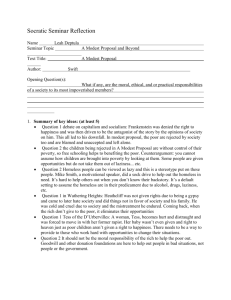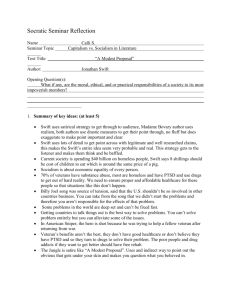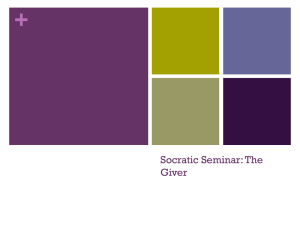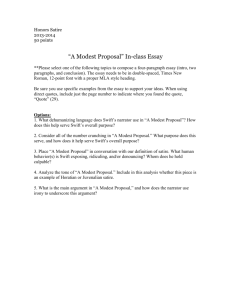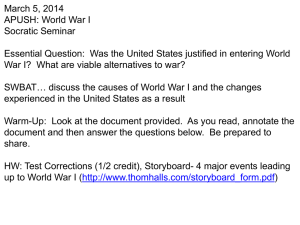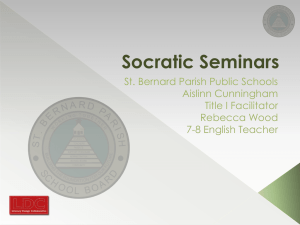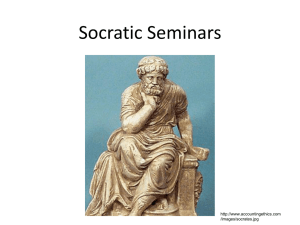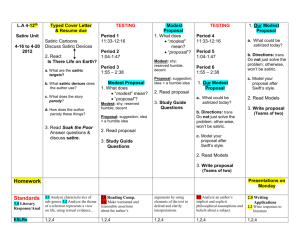Bryant-Davis Soc Sem Questions Teacher
advertisement
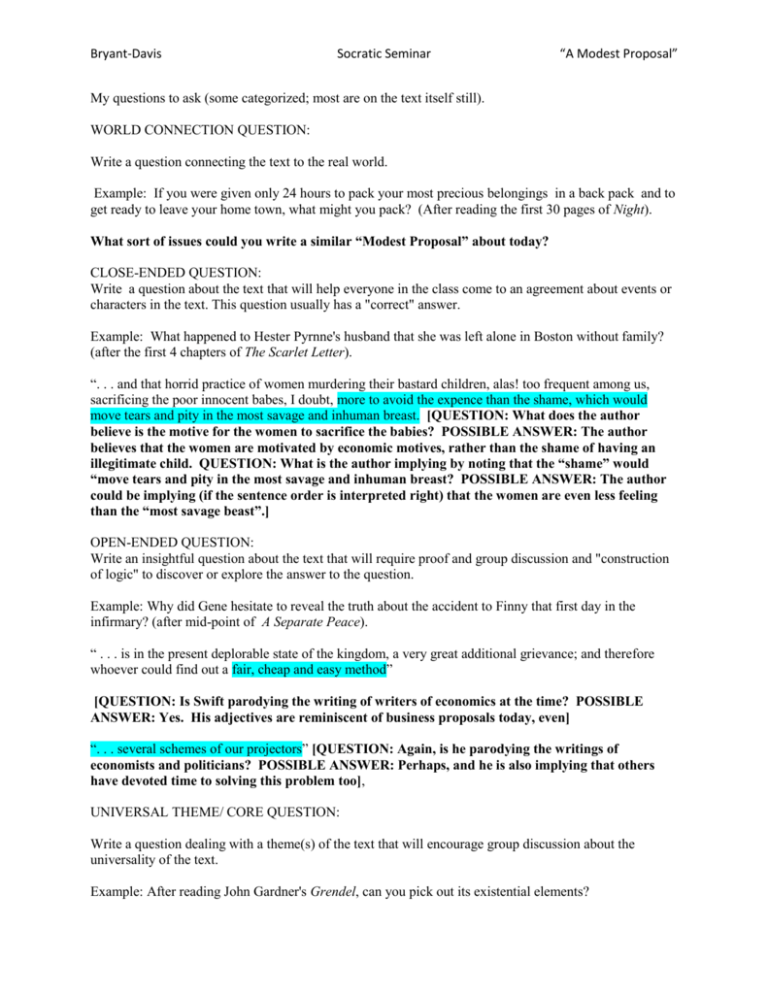
Bryant-Davis Socratic Seminar “A Modest Proposal” My questions to ask (some categorized; most are on the text itself still). WORLD CONNECTION QUESTION: Write a question connecting the text to the real world. Example: If you were given only 24 hours to pack your most precious belongings in a back pack and to get ready to leave your home town, what might you pack? (After reading the first 30 pages of Night). What sort of issues could you write a similar “Modest Proposal” about today? CLOSE-ENDED QUESTION: Write a question about the text that will help everyone in the class come to an agreement about events or characters in the text. This question usually has a "correct" answer. Example: What happened to Hester Pyrnne's husband that she was left alone in Boston without family? (after the first 4 chapters of The Scarlet Letter). “. . . and that horrid practice of women murdering their bastard children, alas! too frequent among us, sacrificing the poor innocent babes, I doubt, more to avoid the expence than the shame, which would move tears and pity in the most savage and inhuman breast. [QUESTION: What does the author believe is the motive for the women to sacrifice the babies? POSSIBLE ANSWER: The author believes that the women are motivated by economic motives, rather than the shame of having an illegitimate child. QUESTION: What is the author implying by noting that the “shame” would “move tears and pity in the most savage and inhuman breast? POSSIBLE ANSWER: The author could be implying (if the sentence order is interpreted right) that the women are even less feeling than the “most savage beast”.] OPEN-ENDED QUESTION: Write an insightful question about the text that will require proof and group discussion and "construction of logic" to discover or explore the answer to the question. Example: Why did Gene hesitate to reveal the truth about the accident to Finny that first day in the infirmary? (after mid-point of A Separate Peace). “ . . . is in the present deplorable state of the kingdom, a very great additional grievance; and therefore whoever could find out a fair, cheap and easy method” [QUESTION: Is Swift parodying the writing of writers of economics at the time? POSSIBLE ANSWER: Yes. His adjectives are reminiscent of business proposals today, even] “. . . several schemes of our projectors” [QUESTION: Again, is he parodying the writings of economists and politicians? POSSIBLE ANSWER: Perhaps, and he is also implying that others have devoted time to solving this problem too], UNIVERSAL THEME/ CORE QUESTION: Write a question dealing with a theme(s) of the text that will encourage group discussion about the universality of the text. Example: After reading John Gardner's Grendel, can you pick out its existential elements? Bryant-Davis Socratic Seminar “A Modest Proposal” What clues are present to let you know that “A Modest Proposal” is a satire? LITERARY ANALYSIS QUESTION: Write a question dealing with HOW an author chose to compose a literary piece. How did the author manipulate point of view, characterization, poetic form, archetypal hero patterns, for example? Example: In MAMA FLORA'S FAMILY, why is it important that the story is told through flashback? How does the author’s tone lend itself to the satire? What can you infer about the typical English attitude toward the British at this time? “I think it is agreed by all parties, that this prodigious number of children in the arms, or on the backs, or at the heels of their mothers” [QUESTION: Swift chooses an interesting way to describe the presence of the children – giving a visual image of many children all around the bodies of their parents. Why? POSSIBLE ANSWER: It links the children to the physical. The image is linked to poverty, as parents with money will either hold just one child, or have one in a baby carriage, and often consign the children to the care of others] “. . . making these children sound and useful members of the common-wealth, would deserve so well of the publick, as to have his statue set up for a preserver of the nation.” [QUESTION: What is the irony here? POSSIBLE ANSWER: Irony here with the title “Modest Proposal” – of course, the author is proposing such a method, and here he is saying that he deserves to have a statue of himself put up. Anything but modest. Literary technique: verbal irony] Interpretive Questions The core of the Socratic Seminar is devoted to considering interpretive questions. These are questions that ask students to interpret the text. They should be genuine questions - ones that you are also interested in. No single right answer exists, but arguments can be made to support different positions. Students need to make their points using passages from the text to answer these questions. Sample interpretive questions might ask for the values evidenced by the author within the text, or might ask students to choose the most important word/sentence/paragraph and describe why it is the most important. “I have always found them grossly mistaken in their computation” [QUESTION: What sort of tone does use of the word “computation” give? POSSIBLE ANSWER: Computation is a mathematical, analytical word, leading to looking at a human problem “objectively” and later on, with the cold voice of statistics]. Literal Questions Literal questions are used by some teachers at the very beginning of a seminar, to ensure comprehension of the text. These are questions that can be answered directly from the text. The answers are contained within the text and are stated clearly. Sample literal questions might ask for an important text detail, fact, or quote. “ . . . our charity” [QUESTION: Why does the author use “our” here? POSSIBLE ANSWER: He is writing to those who are educated and have money – certainly his intended audience is NOT the beggars.] Bryant-Davis Socratic Seminar “A Modest Proposal” “It is true, a child just dropt from its dam,” [QUESTION: What does “dam” mean in this context? ANSWER: Mother. QUESTION: Is “dam” usually used to refer to human mothers? ANSWER: No. QUESTION What is Swift’s use of the word implying? Why? POSSIBLE ANSWER: The poor / Irish Catholics are no different from animals, and can / should be treated as such] Evaluative Questions Evaluative questions are sometimes used at the very end of a seminar, to allow students to share their own positions and opinions. Answers to evaluative questions rely on student’s own experiences, not on the text itself. Students will not need to cite particular passages to answer these questions. Sample evaluative questions might ask for student opinions about the author’s position, or how the ideas in the text relate to their own lives. What sort of issue could be satirized with a similar type of “shocking” satire today?
